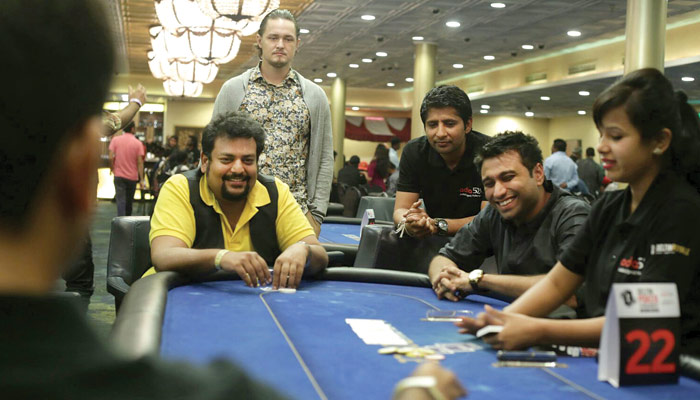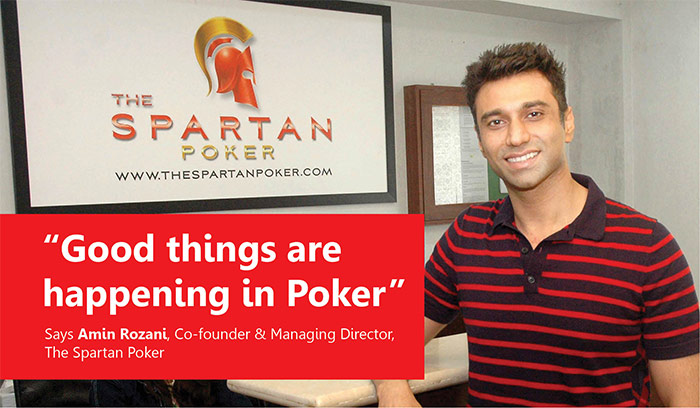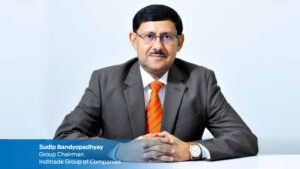IE&M Special
The Supreme Court had asked the Law Commission to look into the issue of legalising betting and gambling following the spot-fixing and betting scandal during the 2013 season of the Indian Premier League. The Commission has submitted its report concluding “it is better for parliament or state legislatures to legalise and strictly regulate gambling and betting activities rather than banning it.”To sum up the detailed report, it has clearly stated that “gambling and betting should be made taxable under the direct and indirect tax regimes and could be used to attract FDI.
In a 2013 report, the Federation of Indian Chambers of Commerce and Industry (FICCI) estimated that the underground betting market in India is huge at Rs. 3,00,000 crore, a figure which is presumed to be double by now.
Market has been taking note of this huge figure. For example, a week back, SpiceJet has announced that it would be starting its daily flight service to Pakyong airport in Sikkim from 4th October onwards. It’s only to increase the footfall at gaming outlets and serve the Gaming operators in Sikkim which have reacted positively to the announcement. In turn, it will also increase the overall tourist inflow to Sikkim. A win win situation for the state where gaming is legal.
Are we really living in a progressive country?
By Krishna Kumar Mishra
Shamefully, like in all the fields where we’ve Acts designed 150 years back by then colonial master, the main piece of legislation relating to gambling in India is the Public Gaming Act of 1867. An Act, which makes it a crime to either run a “public gaming house” or to even be present at one, and provides criminal penalties for both.No government after independence has taken any serious effort to get out of this colonial mindset – there have been some amendments, but the laws remain in place. Certainly, the Act does not talk about online gambling.
Then there’s a definition of gambling in the Constitution of India – “…gambling includes any activity or undertaking whose determination is controlled or influenced by chance or accident or any activity or undertaking which is entered into or undertaken with consciousness of the risk of winning or losing (e.g., prize competitions, a wagering contract)…”
Like all other matters mentioned in the Constitution here again the language used isn’t exactly clear and concise. However, it does suggest that anything where you can risk money to win money could be considered gambling. This would therefore make sports betting, casino games, and poker all illegal. As a result of unclear definition much of the legislation which relates to gambling is very outdated.
Seventh Schedule Entry 34 List II of the Constitution gives the ability to State government to choose the laws with respect to betting. Because of this, different states have an alternate arrangement with respect to different betting recreations.
Every cow is a holy cow as long as the state doesn’t need the milk. The hypocrisy is rife: abortion is a sin, unless it’s needed for my mistress.
As a result, to shore up the state exchequer, playing the lottery is allowed. Most of the states have sanctioned lotteries, which would otherwise certainly qualify as a game of chance.
Betting on horse racing has been legalized at state level, which is in stark contrast to the overall stance on gambling. Perhaps this is because horse racing wouldn’t really have the same appeal were there to be no betting involved, but this is still a great example of the contradictory gambling laws in India.
Despite the popularity of gambling in India, it’s technically prohibited in most of its forms. There is very little in the way of legalized and regulated gambling, which has only given a license to the police to loot. Since the system is well lubricated from the bottomto top no government functionary raises an eyebrow. There are just two smarter state governments in India which have passed state level legislation to allow legalized casino gambling.
Goa was the first to do so, initially to allow slot machines in hotels and subsequently to allow full fledged casinos. The state is now home to several land based casinos, and a number of cruise ship based casinos. The state has been earning millions and has become a very popular tourist destination because of this.
Sikkim was the nextstate to legalize casino gambling, and it currently hosts two land based casinos. It’s also a frontrunner in legalizing online gambling. Sikkim On-line Gaming (Regulation) Rules, 2009, made recreations like Roulette, Black Jack, Pontoon, PuntoBanco, Bingo, Casino Brag, Poker, Poker Dice, Baccarat, Chemin-de-for, Backgammon, Keno, and Super Pan 9 legitimate. These amusements can be lawfully played on the web however the administrator needs to get a permit from the State government. No issue, the government only wants to keep a tab and permits can be obtained easily.
On 8th October 2013 in a historic observation passed by the Karnataka High Court in Indian Poker Association v. State of Karnataka, the Court ruled that playing skill games like poker in recreational club is permitted and no license is required for the same. The High Court verdict opened floodgates for online and offline poker especially in Karnataka.
Maharashtra, which has the ultimate financial districts of India, betting is denied by the State government but Bombay Prevention of Gambling Act, 1887 Segment 3 leaves the extent of a stallion race and canine races, however, race course needs to get a permit from the state government.So Police has a field day during the Diwali and Gujarati’s festivals season, collecting crores of rupees, which is not deposited in the government coffers.
A judgment which involved betting on rummy games, according to the Supreme Court of India, “while games of chance are illegal, games that are based upon preponderance of skills are not.” Under this criteria we assume that poker would be a game of skill as well, especially since with rummy the court found that the falling of the cards, even though it does not involve an element of chance, did include the impact of skill enough to determine that rummy involves a preponderance of skill. And this is exactly how poker works. The Supreme Court has yet to rule on this.
However, the Supreme Court had asked the Law Commission to look into the issue of legalising betting and gambling. After a detailed analysis of the history of gambling in India and other parts of the globe; current legal and constitutional framework governing gambling laws; laws in other International jurisdictions etc., the Law Commission in its report entitled “Legal Framework: Gambling and Sports Betting including in Cricket in India” came to the conclusion that it is better for parliament or state legislatures to legalise and strictly regulate gambling and bettingactivities rather than banning it.
The report says that while it is desirable to ban all gambling activities, it may not be practically possible to enforce it. “[The] incapability to enforce a complete ban has resulted in rampant increase in illegal gambling, resulting in a boom in black-money generation and circulation,” the report says. The commission feels that regulated gambling would ensure detection of fraud and money laundering, etc.
The report suggests a three-pronged strategy—reforming the existing gambling (lottery, horse racing) market,regulating gambling and introducing stringent and overarching regulations.However, the commission then argues that pragmatic considerations mandate a new approach to the flourishing underground gambling market, including online gambling. The report saw just one dissent note by one of the members, who stated that the socio-economic and cultural circumstances of the country are not pragmatic to accept legalised gambling activities, as it is still treated as a social stigma.
Key Recommendations:
- The parliament is empowered to legislate online betting and gambling through telephony, broadcasting or communications law. Parliament can enact a model law to allow highly-regulated versions of gambling that could be adopted by state government.
- Gambling operators must be Indian, but foreign direct investment (FDI) reforms could encourage “technological collaborations, licensing and brand sharing agreements”. The commission has also recommended amending the laws regulating FDI.
- Gamblers should be restricted to a number of gambling transactions per set period, should use specified payment cards or electronic banking to allow auditing of their cashless transactions and be subject to limits on deposits, winnings (to be taxable) or losses. It also suggested linking Aadhaar or PAN cards of an individual indulging in betting and gambling.
- Gamblers should be classified according to their income group, with the lower group banned from higher stakes gambling and poverty-stricken people banned altogether.Those who are underage, receive government subsidies or do not fall within the purview of the Income Tax Act should be debarred from participating in gambling platforms.
- Legislation should be amended to allow gamblers to claim legal winnings in court in the event of a dispute with operators.
Significance of the panel’s suggestions:
The Law Commission functions as an advisory body under the Union Ministry of Law and Justice. As such, its mandate is to provide recommendations and advice on subjects referred to it.The central government is free to accept, reject or defer implementing the suggestions of the Law Commission. It remains to be seen whether the central government will take steps to enact a law to regulate betting and gambling, or put the matter in cold storage. However, the government had disregarded earlier reports by the Mudgal Committee and the LodhaCommitteethat suggested legalising sports betting. However, certainly, the report will provide the impetus for the Supreme Court to rule more favourably for the gambling industry in current and future cases.
Very recently another bigger social stigma attached issue – the LGBT – got a thumbs up from the superior court, overnight curbing the generation of huge black money by the law enforcing agents. Politicians who are entrusted to formulate laws have their own compulsions and boundaries to function in, but the court is considered to take an objective view. It’s high time a clear decision is taken in this regard.
With increasing individual income due to the boost in services and financial sectors and the ease of travel around the world, the high spenders have a wide choice. The younger generation having gone outside the country for various reasons, seen and done all, is certainly not inclined to follow a rule 150 years old.
Financial institutions have already taken a lead in this regard. Dream11, the fantasy sports market leader has secured fresh funding of US$100 million from Chinese social media and gaming giant Tencent Holdings. The investment deal is the biggest transaction in the India gaming industry. And not in a distant past, IIM-Ahmedabad graduate SudhirKamath’s 9stacks, a Poker platform, raised Rs 10 crore in a Pre-Series A funding round.
Here we’ve concentrated on just one – Poker industry since, beyond doubt, Poker is a game of skill rather than one of chance; draws on logic and strategy-making, and demands a good grip on memory and psychology. The first states to make poker legal were Karnataka and West Bengal. Nagaland is issuing licenses to operate poker chains. There’s already a case to legalise poker in Gujarat while Spartan Poker has filed a writ petition in Maharashtra. It’s funny that in Goa, casinos are not allowed on land but no problem if it’s on the sea.Rummy is legal but because poker is relatively unpopular, it is judged from a moral standpoint.
In terms of monetization also, Online poker platforms have only two ways to make money. One is through tournaments where they collect an entry fee. The other mode is by taking a ‘cut’ from the total cash on the table. Both the entry points of incoming cash can be easily regulated by the government for tax purposes.
It’s high time,regarding the gaming industry, the country has a GST kind of system – one rule one nation.
Interview
A Bombay boy with seemingly ordinary persona, very much soft-spoken yet the most daring, flamboyant yet very humble, Amin Rozani, can be best summed up as a visionary. With an impeccable eye towards opportunities and genius at numbers, he is credited to bring the Poker revolution in India. Known for aggressively promoting the game, Poker aficionados call him the Badshaah, Shah Rukh Khan of Indian Poker Industry.
And they couldn’t be wrong. He is one of the most influential advocates of the game, rather what he calls the Mind Sport. Authorities too take his views very seriously; he was a member of the Law Commission panel constituted by Supreme Court of India, to look into the issue of legalising betting and gambling. Live Poker to Online Poker to Poker League, the game has fast caught up with the discerning Indian Poker players and Amin Rozani has always been at the front, deeply associated with its development.
It happened by chance that he went to Macau with a friend and found that the game was not only wildly popular but also rather formalised worldwide. Coming back, together with his three friends Sameer Rattonsey, Rajeev Kanjani, and Peter Abraham, he changed the way poker is played in India. It is their effort that Poker is attracting smarter crowds.
It was an unusual day when Indian Economy & Market entered in his office – the day Essel Group, which operated online poker website PokerNation, ceased operations. And very next day Viaan Industries owned by Raj Kundra and his wife ShilpaShetty was all set to launch a new poker website. So there were too many conflicting happenings. Amin Rozani, a man who believes poker makes you a much sharper individual, and holds all the aces, in a freewheeling chat in his rather very soft and humble voice, answered all such questions.
How you decided to be in the business of Poker?
It was quiet coincidental or accidental. I was previously working with Standard Chartered Bank and post that I was with Tata Jaguar Land Rover. I am certified as a Six Sigma Blackbelt so I was completely a numbers guy. We used to play a lot of Poker on Facebook’s Zynga poker. The app was hit with casual card players who discovered a whole new game called Texas Hold’em. This was a natural progression for those who used to play ‘Flash‘ earlier and suddenly poker became the logical sport to choose. In early April 2009, we travelled to Macau where we saw people really playing with money. It was thrilling and entertaining. In it we found a fantastic business. So we thought let’s try in India. We are a group of four people who started this tournament brand called India Poker Championship in Goa. Earlier we used to get 50-60 people but slowly by 2014 this number went up to 500. The tournament was in a casino that was on a ship. There wasn’t enough space so everybody was not getting a chance to play.
So we decided to keep it online on e-commrce model where you don’t have limitations on infrastructure. You can have as many tables you want and the players don’t have to travel all the way from their own city to Goa. That’s how in March 2015 we started Spartan Poker. We put all our tournaments on this and got fantastic response. The sport was preferred by a lot of youngsters. People had been playing Teen Patti Rummy since ages suddenly they found Poker something new. In Western countries I think even a 5 year old boy must have played Poker. It’s a culture over there. In US it’s so popular that it is given a day – every Thursday is called Poker Night.Poker has just come from West, hardly 10 years back. But it picked up fast.
How has been the journey so far?
I have spent close to 10 years of my youth working with corporates, which as quite comfortable. Once you move to be an entrepreneur it is really difficult. Every day you have to face a lot of challenges. However if I was given a choice to chose between job and entrepreneurship I would 10 out of 10 times chose entrepreneurship regardless of whatsoever difficulties may be. Here every day you get up and face a new challenge, something new to look up to. Life is more exciting. You have your highs and lows. So inspite of all the challenges this journey has been fruitful, has been fun.
You’re known for your aggressive marketing plan.
Spartan Poker has actually pulled off some good marketing strategies. Three things we decided from marketing perspective which worked very well for us – we did a Rickshaw campaign, with close to 18000, all over Mumbai that got viral; in Goa, where people go to play Poker, we are very prominently present. Right from the airport you’ll find a lot of hoardings, and listen to a lot of Radio Ads; and we’re also associated with Poker room in the Bigdaddy (Maharaja) Casino.
Any plan to have Spartan Poker tournament?
India Poker Championship was started in 2009 by us in Goa and the brand is still with us. We intend to start that tournament in early 2019 again in Goa. It will be termed as India Poker Championship presented by Spartan Poker. IPC is a brand which is dear to all of us and there are similar sentiments among Indian players, many of whom had their first taste of live tournament poker at one of our events.
There are two leagues, played live. PSL is owned by AmitBurman of Dabur fame which happens in Goa, second is Raj Kundra’s Match IPL which this time I’m told will happen in Mumbai. There are 12 teams; few of them owned by celebrities and some by local operators and Poker sites. Teams compete and get points on their performances. Roadies fame – Rannvijay Singh Singha is the Owner of the UP Indian team and we sponsor&support that brand. In fact, we have been associated with Poker as a whole with our Poker magazine calledThe Gutshot Magazine; and an online news portal, and we have a first mover advantage. No one can take those benefits which we’ve by default.
How Spartan Poker is different?
Enhancing player experience has always been our goal. Our offers are never misleading or exaggerated. We’ve put in place the most transparent processes, financial systems, and legal compliances. We’re a feedback driven company, and our cashouts are considered the fastest in the industry. These are instrumental in the customer loyalty. We’ve a huge number of users in our database and to retain them with the platform it is important to offer them new and exciting tournaments, challenges and rewards. We are constantly trying to introduce new competitions and challenges for Poker aficionados to prove their prowess. The site hosts a tournament called MillionaireGuarantee which happens on the second Sunday of every month where entry fee is Rs 7700 and total prize pool is one crore. This is the biggest tournament in India so far. If you go to most of the other site you get a guarantee of maximum 10 lakh. That attracts a lot of people. So we’ve a few strategies, which are working well and very nicely accepted by the customers.
You also introduce new games?
Poker already has so many games. We are just trying to get a few games to India. We try to make it more exciting by introducing a lot of different variations every six months. Again the development is very complex. We brought Holdem which is a two card game. We were able to get Omaha which is a 4 card game. Then OFC which is a 15 card game.
How a reader can introduce himself to the sport?
I would recommend they should first go to YouTube where they will find a lot of training videos. Experts actually show how to start, what kind of cards to play, what not to play, and what kind of situations to play. Once they’ve understood they should come to Spartan Poker and only play freeroll tournament games for a while till they gain confidence. After that they can go to the tournaments, starting from Rs 10, and play. Gradually confidence and winning amount will increase if they are able to really perfect the sport.
Poker is a very competitive game, very tough to beat your opponents. Doctors, engineers, lawyers and MBAs play the game. Poker is not about having money but brain. There is a college student, who didn’t deposit a single rupee on our site and he cashed out 6.5 lakh. One just has to be smart, patient, and emotionless. Because what card game or any sport does to you is to beat your opponent you go into an ego war. With poker you have to keep that aside.
Any KYC is involved?
There is no KYC as long as there is no money involved. Otherwise we follow the RBI guidelines. When a person wins then 30 percent TDS has to be paid at every stage just like any other business. We have got payment gateways with all the banks.
Any plans of raising external funds?
To grow everybody needs money. We’ll also be getting an international investor to come and help us but at this point of time Spartan Poker is doing very well. It has shown good profit in the last two years and for the time being there is no desperation for funding.
What is the business model and growth rate?
In terms of revenue, since we started in 2015, we have grown more than 300% every year. This year we are projecting to cross Rs 100 crore; last year the figure was 65 crore including GST, and prior to that it was 24 crore and even prior to that 4 crore. So it was an annual compounding growth of almost 314%.
In terms of players we have grown more than thousand percent from where we started. Today we’ve more than 300,000 players on the site. I think we have more than 6500 active users every day, 35,000 active users a month. At any point of time you’ll find not less than 500 players on the site, which on holidays goes up to 1500. We aim to have half a million players in our database by the end of 2018.
A large number of online Poker start-ups have sprung up.
It’s a very complicated industry, a very execution-heavy space and there is social, tech, legal, and financial hurdles. The top two players Adda52 and Spartan Poker are in the lead. They have their budget which is really aggressive. If I was to enter at this stage I won’t come in this industry. At this stage one has to burn Rs100 crore in two years to feel close to the top two. These two companies itself, I’m guessing, must be spending minimum Rs50 crore every year. Then it’s not only money but also how you spend the money. What we have done in all these years is we understood the player’s psyche and what the customers want, what is the right mode for marketing, where you can invest and get good result.
So where is the road to profitability for a newcomer?
For a startup company it is very difficult space. It would not be easy to have a comfortable expenses versus revenue ratio. All the new companies are really struggling. We also had our share of struggle in the first year but with the first mover advantage and having organized a championship at a big scale, knowing the community of active players it was somewhat easier to bring them on our site, so the first year loss wasn’t that critical. It was our money, and there was no one we were answerable to. We started with Rs 60 lakh to burn. There wasn’t much competition. I would say we have already experimented and realized which marketing strategy will work and which will not work. So we’ve filtered and narrowed down to just 3-4 strategies to stick around. StillI believe players will go wherever the action is, so any platform which is offering some kind of action and value will be able to survive and grow.
What are the legal and regulatory challenges?
There have been quite a few victories on regulatory aspect. West Bengal Gambling Act clearly states that Poker and Rummy is a skill game and an exclusion to the act. It is skill based game. Karnataka High Court has given a similar observation, similarly Delhi High Court. We have Nagaland to issue licenses. We are still fighting in Telangana and Gujarat High Court. When you talk of regulatory challenges Imust say it’s not only with Poker but every single industry had some amount of regulatory challenges, maybe lesser. But we’re certain that our challenges will slowly reduce.
How industry can bust the social myth about Poker?
As an organization we constantly try to do awareness campaigns, tournaments in colleges, in corporate and CSR activities in community services area. We try to show people that Poker is a mind sport. Spartan was a part of Umang Festival at Mithibai College. As industry all the big names in Poker are consciously active to make people understand that Poker is a mind sport meant for intelligent people by roping in celebrities like RannvijaySingha,Chris Gayle, chess player VishvanathanAnand and boxer Vijayendra Singh as their brand ambassador. This way slowly we are trying to bust the myth enshrined since ages. The difficulty is Teen Patti has made the impression such that every time you open cards it is understood to be gambling where no skill is involved. In Poker you can open as many as cards you want to but you can’t win unless you have the intelligence to know how to play the game. You can have 3As or 4As but still there is a chance you might lose. In Teen Patti it’s the cards that decide but in Poker an intelligent and smart mind decides who wins.
How you see the future of online Poker gaming space in India?
When we came to India and started playing Poker and when we used to tell somebody they used to say what is Poker. Today at least they will know that Poker is a card game. So we have come from that stage. We used different platforms, different mediums, different formats to actually educate people about the sport, instilling in them that look, card is not only meant for gambling. You can actually play it like a sport as well. It does not necessarily involve money, and people slowly understood. We call Poker, a Mind Sport. Like if you play on Spartan poker it’s not necessary you have to put money to play. You can play for free also. If you win you get cash prizes. Every two hours Spartan poker has some tournament on the site where you don’t have to deposit money. You only have to use your intelligence and you can make money. As the Law Commission report clearly says the only thing which is stopping us is the social stigma. And as years are passing by and a new generation is coming in who is frequently travelling abroad and watching how the world operates, I believe the social stigma will reduce. Acceptability will be much higher.
You should feel proud that you did the groundwork to get the game such recognition?
The game is bigger than any individual. I don’t know what else I should say. I can only repeat, the sky is the limit for this business if various hurdles are removed and the negative image of the game is got rid of.
























